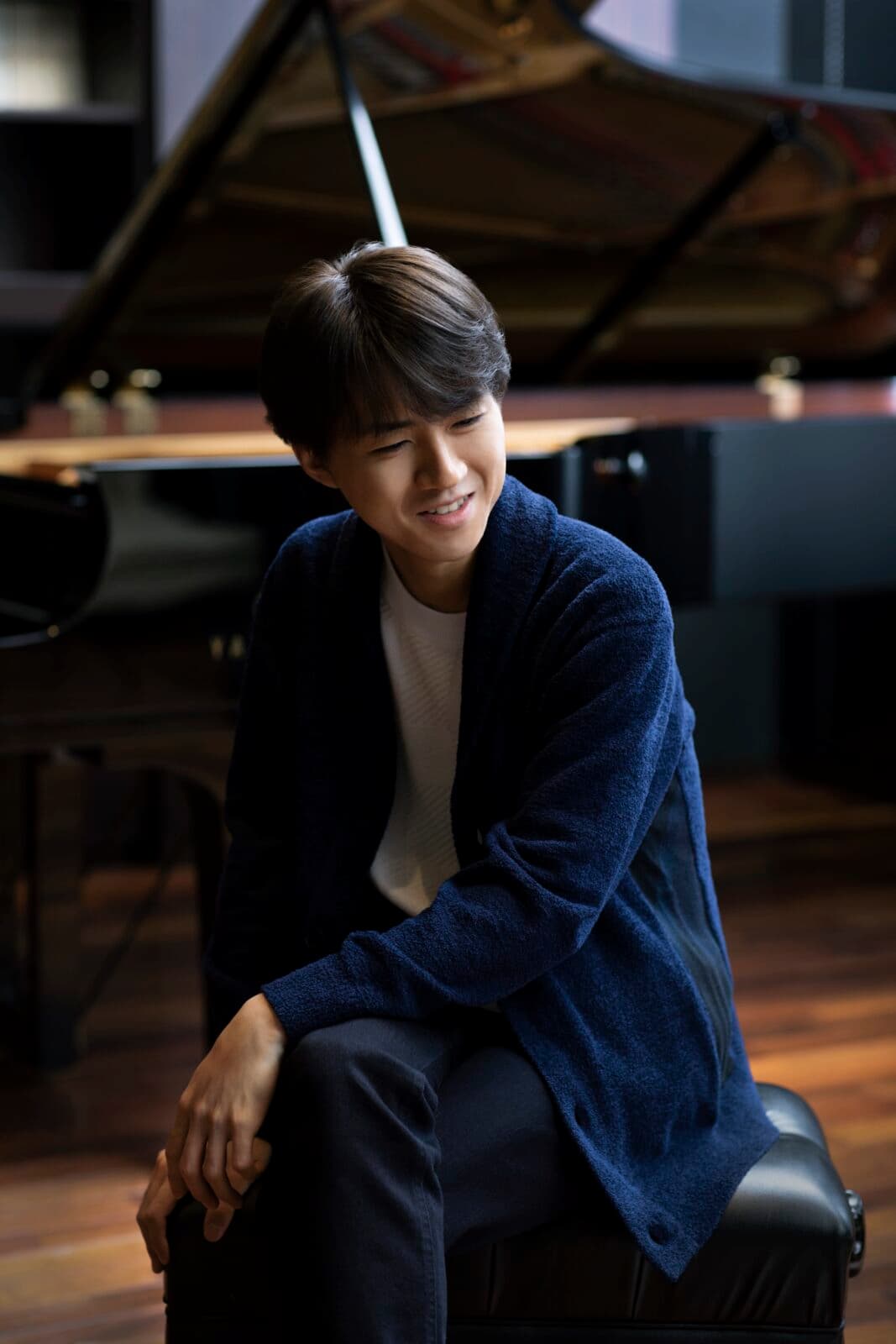In my previous article about the Leeds Piano Competition in 2021, I insinuated some evidence of an “old boys club”, as there were 5 men selected to advance to the finals out of 10 semi-finalists comprising 4 women and 6 men. All the women were disqualified to enter the finals. Not only was it an all-male final, 3 of them attended the Purcell School of Music in London, and they all studied at the Royal Academy of Music and the Royal College of Music. Even though the Competition boasted of contestants emanating from 28 countries with 44 nationalities, they ended up picking winners exclusively from their own backyard. Whether it was “an anomaly in the voting system”, as explained by the artistic director Adam Gatehouse, or a wild co-incidence, it had certainly left plenty of room for awkwardness.

2024 Leeds Piano Competition
Fast forward to September 18th, 2024, before the finals of this current Competition, an article headlining “How the Leeds Piano Competition is rigged for equality” by “Slipped Disc” (a prestigious classical music publication ) disclosed these instructions to the jury :-
4.6 If there are two candidates with equal scores competing for one place and one is a woman candidate, we ask the Juror to consider advancing her first.
4.7 In the instance of a single gender outcome or an outcome that significantly reduces the ratio of women to men in the Competition, there will be a revote for all places.
My questions are: Why is it necessary to give the female gender preferential treatment? Is that fair to all the candidates in the Competition? If I was chosen because of my gender, would that make me honestly feel like I was one of the “best pianists” in the Competition, or just a charitable gesture?
Firstly, if there are 2 candidates with equal scores competing for one place, the juror should tie both candidates, because they indeed have received the same scores, hence are attributed equal status. Instead, the Competition is asking the juror to advance the woman first, which does not make any sense. That is meddling with the professional assessment of the juror.
Secondly, as for the statement “if the outcome significantly reduces the ratio of women to men,….there will be a revote for all places”, I have the following questions :- What if the outcome is fair and square, then why should a revote be necessary, and why would the results be altered? What if a revote produces the same conclusion? When will the process of revoting stop, indefinitely, or when everyone is tired out?
The Telegraph on September 19th, 2024 reported that the instructions given were to “tackle male dominance” and to “aim at eliminating both conscious and unconscious bias in order to promote a more equal environment for all competitors”. Did that imply ongoing discrimination against women existed in the Leeds Competitions and that it laid bare a less equal environment?

2024 Leeds Competition Medici TV’s Audience Choice: Tomoharu Ushida
However, according to an interview with Adam Gatehouse, he admits that “obviously his first priority is to find the best pianist”. His mandate is absolutely justified, and that is the reason we have a team of well-qualified, world-class musicians on the jury to fulfill that responsibility. This year, the esteemed jury consists of internationally acclaimed conductors, music producers, distinguished concert artists, award-winning pianists, experienced educators, and a highly regarded composer and a well-respected cellist. Their job is to put their expertise and insights into full swing and to identify among hundreds of candidates the best pianists who would ultimately deserve the Leeds accolades and prizes. If they do their jobs properly, without bias or prejudice, top pianists, regardless of their gender, will be recognized.
When the results of the finals were announced, and that 3 men and 2 women made it to the finals, there was immediate speculation (as appeared in the Telegraph article) that these 2 women could be pushed ahead of their male counterparts because of their preferential treatment. It was especially noticeable when 2 exceptional pianists (Ryan Zhu and Tomoharu Ushida), who were lauded in all the rounds by accountable sources, particularly in the semi-finals where they received thunderous applause after their individual recitals, and yet surprisingly, were excluded from the finals. Could it be that their places in the finals were reassigned to the 2 women in case of an embarrassing repetition of the all-male participation in the 2021 finals?
Furthermore, in the article on September 19th, 2024, by the Yorkshire Post, Adam Gatehouse cited the following statistics:- In the pre-selection round, there were 366 participants, and 31% of those applicants who went through to the first round were female. Then, after the first round ( when they were filmed ), the balance between females and males improved to 38% and 62%, and, coming into the Leeds second round, there were 9 women and 15 men, a ratio of 37.5% versus 62.5%. The semi-finals had 3 women, and 7 men, a ratio of 30% versus 70%, and the finals had 2 women and 3 men, a ratio of 40% to 60%, neatly in line with the various rounds in the rest of the Competition. Isn’t it incredible that these ratios were so consistent? I wonder if these desired ratios took precedence in the judging over quality, skill, and artistry of the musicians? Why are these numbers important anyway? I thought this was a music competition, not a political election!
One more factor intrigued me:- The new rules of the Competition only restricted themselves to gender at this point in time, but what will stop the administration from extending those rules to other aspects, like race, ethnicity, age or even disability? Will they start to offer preferential treatment to those other categories if any one group is whittled down to being a minority?

2024 Leeds Competition 1st Prize Winner: Jaeden Izik Dzurko
For example, I noticed that in the second round, the balance between non-Asians and Asians was 9 non-Asians to 15 Asians, a ratio of 37.5% versus 62.5%, just like in the gender ratios; in the semifinals, there were 4 non-Asians to 6 Asians, a ratio of 40% versus 60%; and likewise in the finals, it was again, 2 non-Asians versus 3 Asians, a ratio of 40% versus 60%. If we ever experience an influx of overwhelmingly talented Asians advancing to fill all the rounds, would the administration stipulate a revote until the satisfactory ratios between non-Asians and Asians materialize? Would they step in to protect the fate of non-Asians in case they become the minority?
Would these 2024 new clauses be modified to:-
4.6 If there are two candidates with equal scores competing for one place and one is a non-Asian candidate, we ask the Juror to consider advancing him or her first.
4.7 In the instance of a single racial outcome or an outcome that significantly reduces the ratio of non-Asians to Asians in the Competition, there will be a revote for all places.

2024 Leeds Competition 2nd Prize Winner: Junyan Chen
Adam Gatehouse said that he wanted to make the Leeds Competition as humane as possible, into more than just a Piano Competition. “Humane” to me is abiding by the truth and honouring fairness, not simply political correctness, which inevitably could contaminate pure artistic endeavours and ultimately erode their standards of excellence.
For all it’s worth, after following diligently this Competition for a whole week, watching all the 2nd round and semi-final contestants, and revising the first-round performances of those who touched me to confirm my impression, this is unquestionably the “best pianist” in this year’s Leeds Competition :-
Tomoharu Ushida | Leeds International Piano Competition 2024 | Second Round
Tomoharu Ushida | Leeds International Piano Competition 2024 | Semi-Final
For more of the best in classical music, sign up for our E-Newsletter




Whatever next? have the judges no common sense, do they need to be told what to do and how to do it? I am shocked and dismayed by the insensibilities of them all. They do not have the emotional intelligence to judge these amazingly talented and intelligent competitors . I am shocked and horrified at what is happening, and speechless . In my opinion get rid of these nonsensical judges and start over again .
Hmmm… it would be nice if there was one special competition like Leeds in the world.
I think the special rules would have been announced to the contestants well in advance of the competition, so I don’t really see the problem. Someone just hasn’t been chosen as the final 5. And the Japanese contestant who won the Audience Award was already a professional pianist in his home country, touring the country and releasing several albums.
His fans in his home country encouraged each other to vote online and voted heavily. (It’s not bad of course)
I bet a large number of the votes are from his home country fans. And music business will never miss the chance. Thats the story goes.
Speculation and bets do not constitute facts. To be convincing, one has to substantiate one’s claims with concrete evidence like :-
1) All contestants have read the “special” instructions to the jurors and agreed to them, with “no problem”;
2) Medici TV’s investigation and confirmation that their votes for the the Audience Choice are biased, based on the winner’s “countrymen”
manipulating the voting system.
The cream will always float to the top. Time will be the judge.